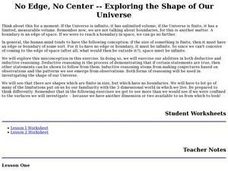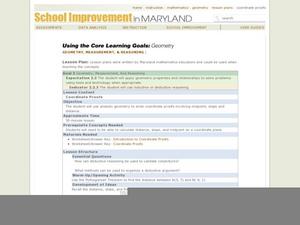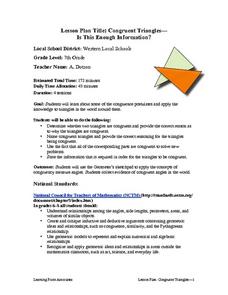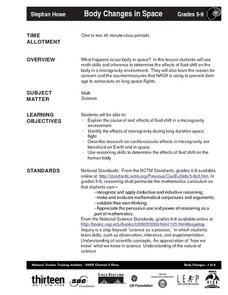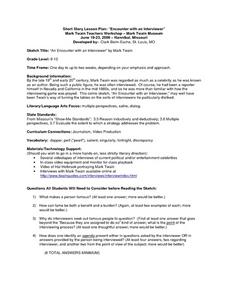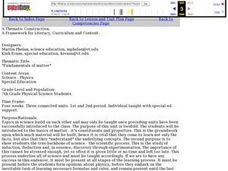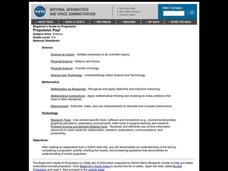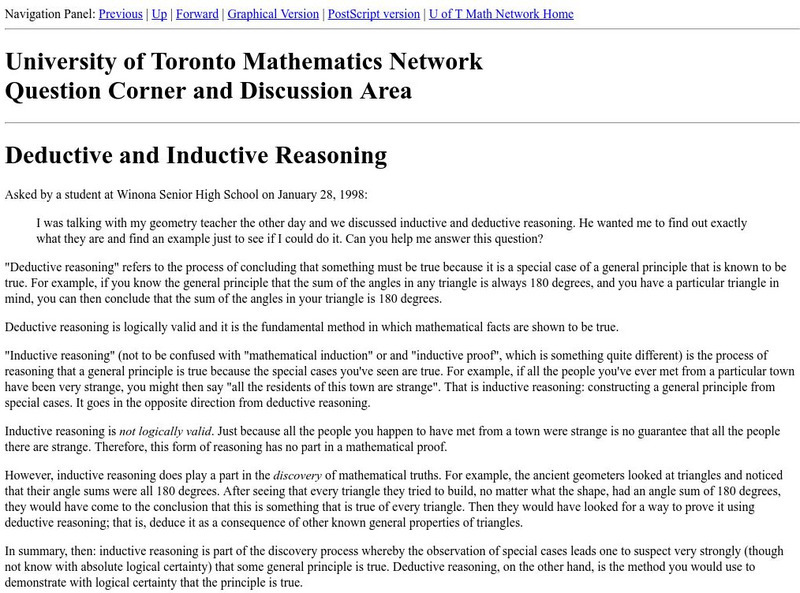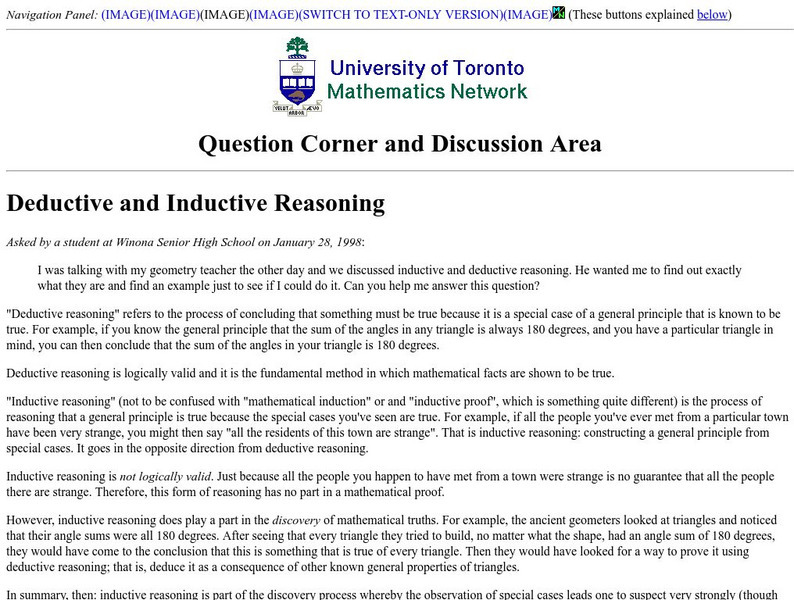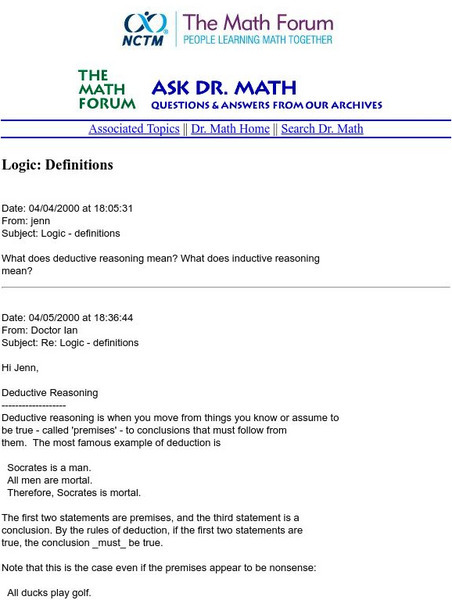Curated OER
Career Paths in My Community
First graders study career opportunities in their local community. In this career exploration instructional activity, 1st graders answer 'Who Am I?' questions and study career path posters. Students list the skills they've learned at...
Curated OER
No Edge, No Center -- Exploring the Shape of Our Universe
Students examine various "spaces" (including ones that are one-dimensional, two-dimensional, and three-dimensional). For each space, they will examine what it means to have or not have an edge, or to be finite or infinite.
Curated OER
Coordinate Proofs
Students explore the concept of coordinate proofs. In this coordinate proofs lesson, students write coordinate proofs using properties of distance, slope, and midpoint. Students discuss why it is sometimes beneficial to double the...
Curated OER
Geometry in Tessellations
Students examine tessellations and their geometric properties. Students also develop a better understanding of lines, planes, angles, and polygons.
Curated OER
Congruent Triangles - Is This Enough Information?
Seventh graders examine congruence postulates and apply knowledge to triangles in the world around them.
Curated OER
Body Changes in Space
Students explain the cause of and effects of fluid shift in a microgravity
environment. Students identify the effects of microgravity during long duration space flight. Students describe research on cardiovascular effects in microgravity...
Curated OER
Encounter with an Interviewer
Students read the Mark Twain short story, Encounter with an Interviewer. They study "the interview" and discuss the role of the interviewer and the person being interviewed. They conduct mock interviews, constructing questions and...
Curated OER
What was Newton's Idea of Science?
Learners form logical foundations for analysis of observations. They improve analytic reading abilities through practice. Students investigate the foundations of scientific thought processes and how to apply them.
Curated OER
Plant Motion: The Untold Secrets
Students identify and categorize knowledge needed to design an experiment. They observe, recognize and describe the motion viewed. They document any changes caused by various solutions.
Curated OER
Fundamentals of Matter
Seventh graders explore the the constituents and properties of matter. They use the scientific process while exploring solids, liquids, gases, the mass, volume and density of matter. Students plan and conduct an investigation to measure...
Curated OER
Calendar and Opening
Students review the days of the week and tell what the current day is by singing a song. They fill in the sentence telling the day of the week it is and then discuss what day yesterday was and the name of the day tomorrow and then talk...
Curated OER
Angle Attributes and Measures
Seventh graders explore the concept of angles. In this angles lesson, 7th graders use protractors to measure angles. Students sing an angle song. Students discuss attributes of angles using a two-color plate manipulative.
Curated OER
What Would You Fly?
Young scholars, after reading an explanation from a NASA Web site, demonstrate an understanding of the text by writing an essay that applies the information found in the slides to a real-life question.
Curated OER
Propulsion Pop!
Students demonstrate an understanding of the text by completing a propulsion activity, charting the results, and answering questions that demonstrate an understanding of rocket propulsion.
Pennsylvania Department of Education
Creating Polygons
Students describe, make and compare polygons. For this creating polygons lesson, students identify properties of quadrilaterals and describe common features of two dimensional shapes.
Texas Education Agency
Texas Gateway: Distinguishing Between Inductive and Deductive Reasoning
This lesson focuses on distinguishing between inductive and deductive reasoning. Sometimes it's difficult to separate these two types of reasoning because we often use them together; drawing conclusions in inductive reasoning is likely...
Web Center for Social Research Methods
Research Methods Knowledge Base: Deduction and Induction
This site provides a good explanation of deductive and inductive thinking.
University of Toronto (Canada)
University of Toronto: Deductive and Inductive Reasoning
Part of a University of Toronto website, this page defines and describes deductive and inductive reasoning in solving mathematical problems.
Science Struck
Science Struck: Examples of Deductive Reasoning
Learn what deductive reasoning is and look at examples of how to apply it.
San Jose State University
San Jose St. Univ.: Inductive and Deductive Reasoning
Resource distinguishes between the two forms of argument: deductive vs. inductive reasoning by providing examples and explanations. There are also some practice exercises given to further your understanding.
New Advent
Catholic Encyclopedia: Induction
Excellent article that clearly explains the meaning and significance of "induction" in the history of philosophy. Relates the concept to philosophy of science as well as epistemology, demonstrating how the issues raised by induction are...
PBS
Pbs Learning Media: Teaching Tips: Deductive and Inductive Reasoning (1St Grade)
Use these teaching tips from the PBS Kids Lab to help children make sense of problems and persevere in solving them, determine the unknown whole number in an addition or subtraction equations, use addition and subtraction within 20 to...
University of Toronto (Canada)
Question Corner: Deductive and Inductive Reasoning
A simple discussion of the differences between inductive and deductive reasoning. Helpful to anyone who is having difficulty differentiating between the two.
National Council of Teachers of Mathematics
The Math Forum: Ask Dr. Math: Logic Definitions: Inductive & Deductive
This site explains what deductive and inductive reasoning is. The site also explains abductive reasoning.

